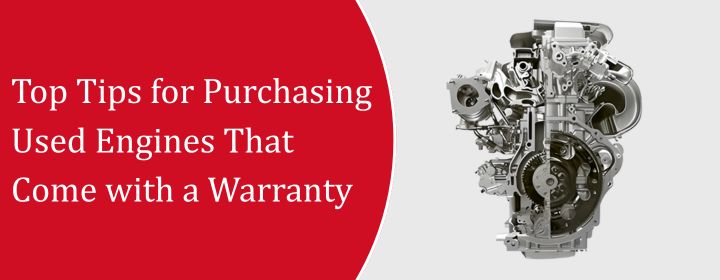
Top Tips for Purchasing Used Engines That Come with a Warranty
Buying a used engine can either save your wallet or wreck it. There’s no middle ground. You’ll either find a solid, clean engine that runs like a dream or end up with a block of metal that barely turns over. That’s why a warranty matters. It’s not just about peace of mind; it’s about having real protection if something goes sideways after installation. Mostly people starts searching used engines for sale online and forget to ask basic question like duration of warranty, what does it covers, and who is actually responsible if it fails. And because many buyers skip this, they get burned. Here in this guide, we will walk through what you should really look for before you spend a dime on used engines with warranty.
What Is a Used Engine?
A used engine is basically a motor which has been pulled out from another car, usually one that was wrecked, totaled, or retired for parts. Sometimes it’s from a vehicle that had body damage but the engine’s still solid. Other times, it’s from high-mileage cars where the drivetrain’s the only thing worth saving.
Now, here’s the catch: not all used engines are equal. Some are tested and inspected which means it was checked for compression, leaks, and overall condition. Others might just be pulled and sold ‘as-is’. That’s where the warranty comes into play.
A good seller like beelinesautomotive.com will always offer used engines with warranty which depicts that seller stand behind the product.
Top 7 Tips to Purchase a Used Engines with Warranty
1. Always ask for the Engine’s History
It should be the first concern that where did it come from? Was the car wrecked? Flooded? Stolen and recovered? You’d be surprised how many engines come out of water-damaged vehicles and are still being sold as ‘good’.
Ask for the VIN of the donor car. Reputable sellers like beelinesautomotive.com will have that info on hand. Use it to check the vehicle history online. If the car had major flood or fire damage then you need to simply walk away. It doesn’t matter even if it runs because corrosion inside the block or electrical connectors can turn it into a nightmare later.
2. Check the Mileage and Condition Reports
Mileage matters the most when you buy used engines for sale. Aim to buy a low-mileage engine. Low-mileage engine means less worn-out components and less leaks with longevity.
Genuine sellers also list the mileage with compression test results and inspection reports. You just need to read them carefully. If the numbers doesn’t make sense or the report feels too generic with words like tested or inspection then ask for photos of the test or skip it. If seller fails to show the mileage verification proof, just walk away.
3. Understand the Warranty Terms, Don’t Assume
A warranty can mean various different things depending on who you are buying from. Some cover 30 days. Others go up to 90 days like beelinesautomotive.com. The trick is to know what’s actually covered.
Does it cover parts only or parts and labor? To know this, you have to read the fine print. Many of the warranty get null if you overheat the engine or use aftermarket parts. Make sure you know what you’re getting into before you finalize the deal.
4. Buy from Reputable Sellers, Not Random Listings
This one’s obvious but it is where most people mess up. Facebook Marketplace and random Craigslist ads are full of great deals until you realize the engine is cracked, missing sensors, or not even the right one for your car.
Stick to trusted sources like beelinesautomotive.com that are specialize in used auto parts. Look for companies that clearly list used engines for sale with warranty details right on the page.
5. Inspect Before You Buy
Go and inspect the engine in person, if you can. Look around and see for leak, broken sensor, rust, or missing part. Pull out the oil dipstick and if it smells burnt or looks milky then it’s a bad sign. Look at the exhaust ports and inside the intake, if there is any buildup or sludge, it tells you how well it was maintained.
If you’re buying online and can’t inspect it yourself, ask for detailed pictures and videos of the engine running before it was pulled. A genuine seller won’t have a problem providing that.
6. Ask About Compatibility and Installation Support
Engines aren’t universal even within the same car model there is different variants of engines. So, you need to always double-check whether the engine you’re buying is compatible or not.
A good supplier will confirm compatibility using your VIN. Some even offer install guides or tech support. Take advantage of that, nothing is worse than realizing your perfect used engine doesn’t match with your transmission or ECU.
7. Don’t Chase the Cheapest Deal
It’s tempting to buy the lowest price you can find but cheap engines are cheap for a reason. It can be because mileage is high, testing is minimal, or warranty is basically worthless. Decent used engines with warranty will always cost a bit more. You are paying for the assurance that it was tested, documented, and backed by warranty.
Conclusion
In short, we can say that buying used engines with warranty isn’t that difficult. But it requires patience and research. You can start the buying process by verified vehicle history and knowing warranty terms. Never make your decision on the basis of price, there are also certain factors which you need to consider such as quality and protection. So, next time when you search for used engines for sale, no need to rush. Ask question, read the fine print carefully and remember that the best engine deal is one which still runs strong even after the years.